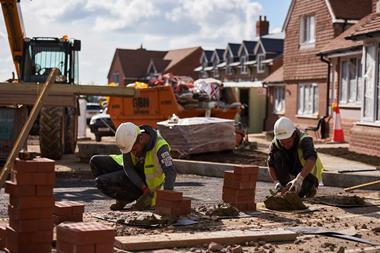With all the major housebuilders having now reported their latest results, it’s hard to avoid the conclusion that commercially the industry is in its best shape for seven years. Talk to any housebuilder, though, and the growing skills shortage is topping the list of longer-term worries, ahead of the perpetual concerns about planning.
Our own recovery was underlined last week by a doubling of profits and a new return on capital target. It wasn’t a recovery built on last week’s sales figures, but on a land investment strategy started five years ago and on improving every aspect of our operational performance.
Since then, we have committed £3.8bn in land investment, identifying where we want to invest and the types of homes we want to build. The new sites we acquired are now driving up returns. Last year, we committed to buy 21,400 plots and this year we’re looking to bring 180 new sites into production.
We now have a planning regime that is working better than most people in the industry can remember. It is right that local authorities should be able to demonstrate a five-year land supply for the people who will live in their area. That doesn’t make planning easy, quick or low cost, but there is more certainty.
We used the downturn to change every aspect of what we do. We focused on improving quality, customer service, efficiency and supply change management. Operationally and financially the business is in good shape. But if we are to continue our progress as an industry, we need to solve some longer-term issues before they become short-term crises.
The first, the skills shortage, is already upon us. We need to address the problem of who will build the homes we sell. The housing and construction industry itself has to step up and solve this problem.
The industry has to do more to attract and retain the people we need. A recent Construction Industry Training Board report makes grim reading: the industry has lost 350,000 employees since 2008 and now requires an additional 182,000 construction jobs by 2018 as output continues to grow.
If anything, that underplays the challenge. On a slightly longer timescale, output would need to rise to 250,000 a year to meet the housing need.
Two other factors also come into play here. The profile of the existing workforce is ageing fast, and fewer young people see our industry as an attractive option: only 1% of 16-18-year olds want a career in construction.
There is no short-term fix, but the industry is starting to address these issues. The Home Builders Federation (HBF) will be campaigning hard to raise the profile of the industry and to change its reputation among potential recruits. Elsewhere, the UK Contractors Group has launched its “Born to Build” campaign aimed at debunking myths about construction jobs.
Every component of the industry will have to play its part.
We have committed to recruit 1,100 apprentices, graduates and trainees over three years, having hit our previous target a year sooner than expected. To do this, we will have to reach out to schools and colleges in a systematic way. That is why we are to regionalise our recruitment processes for apprentices and will trial a regional skills academy in the East Midlands.
Beyond this, we will have to target less traditional sources of labour. The industry has already identified ex-military personnel as a rich source of suitable recruits, for example, in site management. But we need to go further. The communities in which we operate are richly diverse and we need to reflect that.
The skills issue facing our industry is not, however, just a numbers game. We also need to look at the type of skills we employ and how we augment those.
Labour and material bottlenecks are already making modern methods of construction such as offsite manufacture more appealing. That is a trend that will continue and will also be driven by the need for higher environmental and safety standards on site.
It’s likely to amount to a quiet revolution in how we build homes and one that will require different skills and a different approach. That is the rationale for the development programmes we have launched within the company and the foundation degree in construction that we have pioneered with Sheffield Hallam University.
We have to resolve these issues. They go to the heart of building more, as well as better, homes. But we cannot do so without improving the reputation of the industry as a modern, safe and secure place to work.
Mark Clare is chief executive of Barratt Developments
































No comments yet